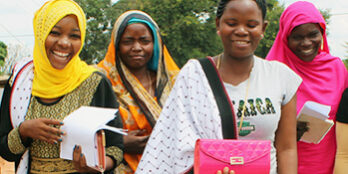Tamasha / Oxfam / Tanzania
Background
In many Tanzanian communities, women and youth are often excluded from local planning and decision-making processes. In the districts of Mbogwe and Kigoma, marginalization drives corruption on the part of unaccountable local officials, prevents women and youth from receiving critical public services, and contributes to violent conflict within and across communities.
Our partners at Tamasha and Oxfam set out to address these issues. They intended to use the power of participatory action research to catalyze action by marginalized citizens and, by animating local action in Kigoma and Mbogwe, to strengthen participation and accountability, and improve lives.
Doing this effectively in practice, though, was hard, especially because of the complexity of the issues at hand. What were the root causes of the identified problem – why and how were women and youth excluded from local governance processes? What strategy should Tamasha and Oxfam use to tackle the problem? Are there experiences from other countries and contexts that should inform their efforts? How could they track progress, make sure they make course corrections when necessary?
Our approach
The Strategy & Learning services provided by Global Integrity proved to be very effective in helping the team understand and tackle these challenges. Applying the methodology involved working with Tamasha and Oxfam to:
- analyze the problem and relevant stakeholders
- develop and test a strategy for addressing the problem
- collect and make use of data about the problem, its politics, and progress
- learn from others tackling similar problems in other countries.
Through applying this learning-centered, adaptive, needs-driven approach to their work, the team was able to generate real-time lessons on their effectiveness, as well as to identify unforeseen challenges as they emerged, and course correct when necessary.
The outcome
Tamasha and Oxfam learned that their initial strategy – which revolved around informing citizens about the Open Government Partnership, and getting youth and women to take action on national-level OGP priorities – would have been unlikely to help address the power balances that caused marginalization.
So they adapted, concentrating instead on convening meetings of local citizens – including youth and women – and facilitating their efforts to identify and prioritize specific governance problems in their communities. These ‘people’s committees’ provided a formal space for youth and women to make their voices heard. The committees became a space for inclusive community dialogue, and helped local citizens work out how to force action on issues they cared about
Tamasha and Oxfam also learned how to help these committees effectively engage with the district councils, leverage their collective voice, and force their councils to commit to addressing priority issues. They also assisted these committees in monitoring and reporting on the implementation of those commitments.
By the project’s end, women and youth, as well as other marginalized groups, were far more involved in local decision making processes, and district councils had taken concrete actions to address community priorities, such as driving out officials who had embezzled public funds, and building and maintaining public latrines.
